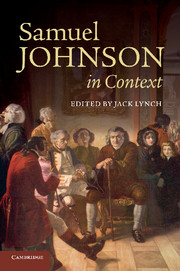Book contents
- Frontmatter
- Contents
- Illustrations
- Contributors
- Preface
- Chronology
- Abbreviations
- Part I Life and works
- Part II Critical fortunes
- Part III Contexts
- Chapter 10 America
- Chapter 11 Anglicanism
- Chapter 12 Anthropology
- Chapter 13 Authorship
- Chapter 14 Biography
- Chapter 15 Book trade
- Chapter 16 Clubs
- Chapter 17 Conversation
- Chapter 18 Dictionaries
- Chapter 19 Domestic life
- Chapter 20 Education
- Chapter 21 Empire
- Chapter 22 Essays
- Chapter 23 Fiction
- Chapter 24 History
- Chapter 25 Journalism
- Chapter 26 Law
- Chapter 27 Literary criticism
- Chapter 28 London
- Chapter 29 Medicine
- Chapter 30 Mental health
- Chapter 31 Money
- Chapter 32 Nationalism
- Chapter 33 Philosophy
- Chapter 34 Poetry
- Chapter 35 Politics
- Chapter 36 Scholarship
- Chapter 37 Science and technology
- Chapter 38 Scotland
- Chapter 39 Sermons
- Chapter 40 Shakespeare
- Chapter 41 Slavery and abolition
- Chapter 42 Social hierarchy
- Chapter 43 Theatre
- Chapter 44 Travel
- Chapter 45 Visual arts
- Chapter 46 War
- Chapter 47 Women writers
- Further reading
- Index
- References
Chapter 39 - Sermons
from Part III - Contexts
Published online by Cambridge University Press: 05 June 2012
- Frontmatter
- Contents
- Illustrations
- Contributors
- Preface
- Chronology
- Abbreviations
- Part I Life and works
- Part II Critical fortunes
- Part III Contexts
- Chapter 10 America
- Chapter 11 Anglicanism
- Chapter 12 Anthropology
- Chapter 13 Authorship
- Chapter 14 Biography
- Chapter 15 Book trade
- Chapter 16 Clubs
- Chapter 17 Conversation
- Chapter 18 Dictionaries
- Chapter 19 Domestic life
- Chapter 20 Education
- Chapter 21 Empire
- Chapter 22 Essays
- Chapter 23 Fiction
- Chapter 24 History
- Chapter 25 Journalism
- Chapter 26 Law
- Chapter 27 Literary criticism
- Chapter 28 London
- Chapter 29 Medicine
- Chapter 30 Mental health
- Chapter 31 Money
- Chapter 32 Nationalism
- Chapter 33 Philosophy
- Chapter 34 Poetry
- Chapter 35 Politics
- Chapter 36 Scholarship
- Chapter 37 Science and technology
- Chapter 38 Scotland
- Chapter 39 Sermons
- Chapter 40 Shakespeare
- Chapter 41 Slavery and abolition
- Chapter 42 Social hierarchy
- Chapter 43 Theatre
- Chapter 44 Travel
- Chapter 45 Visual arts
- Chapter 46 War
- Chapter 47 Women writers
- Further reading
- Index
- References
Summary
SE′RMON. n.s. [sermon, Fr. sermo, Lat.] A discourse of instruction pronounced by a divine for the edification of the people.
His preaching much, but more his practice wrought;
A living sermon of the truths he taught. Dryden.
Samuel Johnson’s sermons have received the least attention of any of the categories of his writing, despite the fact that his religious beliefs and moral philosophy are perennial topics of scholarship. My observation is not new; James Gray opened Johnson’s Sermons: A Study (1972) with two reasons for “this apparent lacuna in Johnsonian scholarship”: doubt, dating back to Johnson’s lifetime, as to the authorship of the sermons themselves, and a bias against homiletic writings on the part of literary scholars. Gray’s account of the status of Johnson’s sermons in Johnsonian scholarship of the first half of the twentieth century holds true for their status in the opening years of the twenty-first as well; Johnson’s Sermons: A Study is still the only book-length treatment of Johnson’s homiletic writing. I believe this is because of the same pair of reasons: (1) we cannot be completely sure that the sermons were authored solely by Samuel Johnson, and (2) homiletic writing, despite its popularity during the eighteenth century, remains unpopular in eighteenth-century literary scholarship. Placing Johnson’s sermons in their eighteenth-century context thus involves taking ourselves out of our twenty-first-century contexts, specifically of how we value homiletic writing and of how we think of authorship. In the eighteenth century, both of these topics were thought of quite differently than they are now.
Sermons as literature
When Johnson remarked to John Wilkes in 1781 that sermons “make a considerable branch of English literature” (Boswell, Life, 4:105), he was commenting on more than their aesthetic literary value. A major shift in homiletic writing had occurred over the first fifty or so years of the eighteenth century. Sermons were increasingly written for the bookshelf and the hearthside, as well as for use in the pulpit. Sermon literature became popular outside the church among lay readers who purchased individually published sermons and collections of homiletic writings for private devotional reading, for family prayers, or for meetings of pious societies for the reformation of manners. In parishes where Sunday services did not always include a sermon – often the case if the incumbent preacher had multiple livings – or where the preaching was deemed dull and uninspiring, members of those congregations could make up the lack at home by reading published sermons out loud. The market for printed sermons burgeoned; even so inveterate a preacher as John Wesley began writing sermons specifically for publication, works that differed vastly in tone and style from those we are told he actually preached. Booksellers capitalized on this demand by publishing large numbers of sermons, in collections or by individual authors, so much so that by 1742 Henry Fielding’s Joseph Andrews could feature a bookseller complaining about how the trade was “so vastly stocked” with sermons that his shelves had room for no more.
- Type
- Chapter
- Information
- Samuel Johnson in Context , pp. 337 - 342Publisher: Cambridge University PressPrint publication year: 2011



